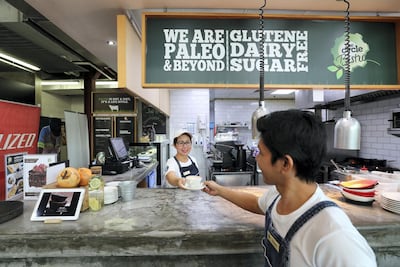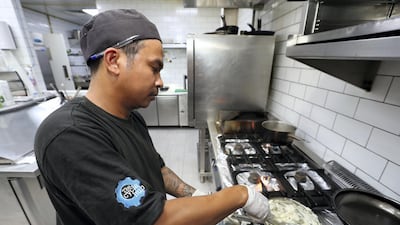A new Dubai initiative requiring all restaurants to declare the amount of calories in every dish they serve is a "huge step forward" for the health of the emirate, an expert has said.
Dubai Municipality announced on Saturday that all restaurants, cafeterias and cafes with more than five branches must comply with the directive by November, while catering establishments and hotels must fall in line by January.
The goal is to help tackle levels of obesity and the knock-on effects of related health conditions such as diabetes and heart disease.
A nutritionist backed the strategy, but said calorie counting is only one part of leading a healthier lifestyle.
“This is a huge step forward, but there is more to food than just calories,” said Dr Sadaf Jalil Ahmed, a nutrition expert and school doctor in Dubai.
“Menus should also include a breakdown of nutritional value, such as fat content, fibre, carbohydrates and protein.
“If consumers had a rough estimate of what each age group requires, that would also help educate them.”
Daily calorie requirements vary hugely, and are dependent on age and activity levels.
Body size and shape are crucial factors in daily energy requirements.
An active 8-year-old, for example, requires about 1,800 calories a day, whereas an active teenager would require about 3,200.
“These menu changes could help people make more informed choices, and it will be easier for adults to set the right example to their children when eating out,” said Dr Sadaf.
“It is a big ask for restaurants to provide accurate information on menus, but it can be done with careful portion control.”
In a spot check of well-established restaurants in Dubai, The National found only one displayed the calorie content on food sold.
Burger Fuel, Projecto Acai, Nando's, Friends Avenue Cafe, Papa Murphy’s Pizza, Broccoli Pizza and Pasta, Crumbs, Kababji, Wendy’s and Subway were all checked, but none offered calorific information.
Only Cycle Hub in Motor City disclosed the calorie content of every meal it offers.
In a similar business model to that of Kcal restaurants in Dubai, Cycle Hub provides a breakdown of the content of each dish.
Although the calorie content of each item is not printed on the menu, a separate list is available with the calorie information and carbohydrate, protein and fat content of each dish.
Dubai Municipality said it would work with businesses to ensure they were providing accurate information for consumers on menus at the point of sale.
The authority will provide an online calculator restaurants can use to determine the calorie content of meals, and a recognised database of commonly served food.
If restaurants choose to change portion sizes, they must also change the menus to reflect the new calorie content.

“Our menu is driven by customer behaviour, but there are some people who do not really care about the nutritional benefit of the food they eat when they are in a restaurant,” said Ghofrane Souayah, from the Cycle Hub.
“We do not see fast-food chains as competitors. Our chef is tasked with ensuring the nutritional content of each dish is accurate, and a lot of time goes into this.
“It is not an easy thing to do, but an important part of the service we provide.”
Some large chain establishments have already taken steps to print more information on menus, with Wendy's planning to have the information in place after Eid.
Danrie Salac, 28, from the Philippines, is branch manager of Chili's at First Avenue Mall, Motor City, and backs the move.
Read More
Scientists claim new pill 'could solve obesity crisis'
Some Emirati infants fed unhealthy diet of fries, cakes and biscuits, study finds
Obesity and diabetes rates begin to decrease, National Health Survey shows
“This will encourage people to make healthier choices, but there will still be those customers who still won’t take much notice of what they are eating,” he said.
“We already have people asking about the calories of the menu options, so it is something they are thinking about.
“It may be difficult for smaller restaurants to implement this accurately, but it is a good start.”
McDonald’s is one fast food restaurant leading the way in providing information online about each menu choice.
One Big Mac contains 540 calories, 28 grams fat, 46g carbohydrates and 25g protein.
A full breakdown shows the burger also has 10g saturated fat, 940mg salt and 9g sugar.
On average, adult women require from 1,600 to 2,400 calories per day, while men need slightly more - between 2,000 to 3,000 calories.
Under the Dubai Municipality directive, restaurants will not be legally obliged to include the extra nutritional detail.
The municipality's programme is part of a wider plan for a healthier nation under the National Nutrition Agenda 2017-2021.


